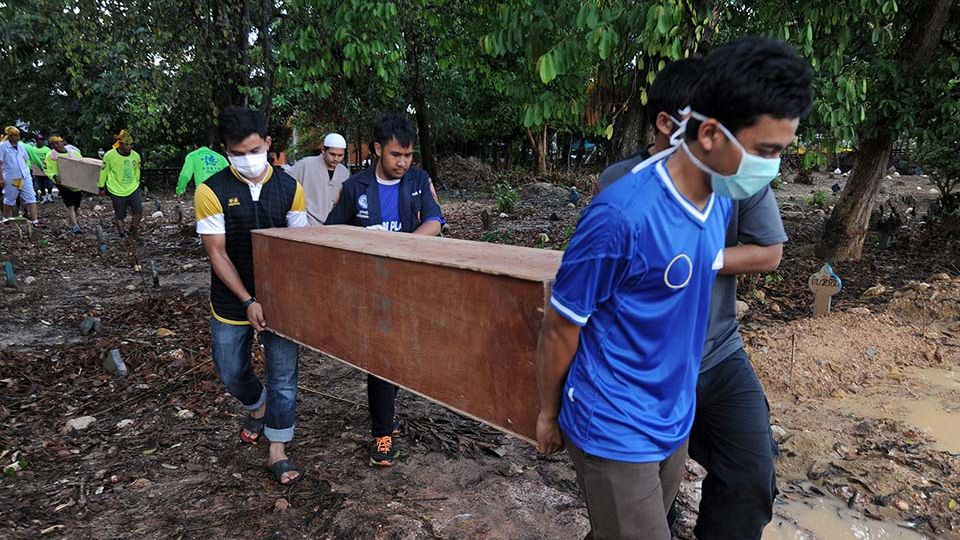April 17, 2025
DHAKA – Kazi Salauddin, a 44-year-old man from Cumilla, migrated to Saudi Arabia in October 2022, hoping to secure a bright future for his family. But barely a year later, Salauddin, the father of two daughters and a son, died suddenly.
His death certificate, issued by the Saudi authorities, mentioned heart attack as the cause of death. But his family finds this hard to believe as the middle-aged man had no history of heart-related problems or any other ailments.
His wife, Yasmin Begum, said she was awaiting an explanation for the sudden death of her husband, whose body was brought home in June last year.
“I want to know why my husband, who was in good health, died suddenly. I went from one office to another of relevant government agencies, but I’m yet to get an answer. If I could know the real cause of his death, it would at least ease my pain a little,” she told The Daily Star.
Salauddin was among the 4,813 migrant workers whose bodies were brought home last year, according to data of the Wage Earners’ Welfare Board under the expatriates’ welfare and overseas employment ministry.
Statistics show a steady rise in deaths of migrant workers since 2020. The number rose to 4,813 last year from 4,552 in 2023, which was 3,904 in 2022; 3,818 in 2021; and 3,140 in 2020.
On average, 400 bodies arrived each month, equating to about 13 per day. In January this year, 447 bodies were brought home.
Since 1993, bodies of at least 57,216 migrant workers have been repatriated to Bangladesh. Most deaths occurred in Middle Eastern countries, with Saudi Arabia topping the list, followed by Malaysia, the UAE, Oman and Kuwait.
Of the 4,813 migrant deaths last year, 1,626 occurred in Saudi Arabia that employs around 30 lakh Bangladeshi expatriates. In 2023, at least 1,241 migrant workers died in the Kingdom.
Officials at the Welfare Board acknowledge that many more workers were buried on foreign soil. Some families choose not to bring home the bodies of their loved ones, allowing Bangladeshi embassies to arrange burials abroad.
When a body is repatriated, the Welfare Board provides Tk 35,000 to the family of the deceased worker for burial and transportation.
UNKNOWN CAUSES AND LACK OF RESEARCH
The expatriates’ welfare ministry classifies deaths resulting from illness as natural causes.
Government data suggest that most migrant deaths occur due to stroke or brain hemorrhage. Other causes include heart diseases, work-related accidents, road crashes, suicides, and homicide.
The majority of the deceased were between the age of 38 and 42, with many dying within a brief period after joining work.
Despite this alarming trend, the government has yet to conduct any studies or investigations to determine why so many workers are dying abroad.
WHY ARE MIGRANT WORKERS DYING?
Prof Tasneem Siddiqui, acting executive director of the Refugee and Migratory Movements Research Unit (RMMRU), said Middle Eastern countries have extreme desert climates, and unskilled Bangladeshi workers are often employed in high-risk jobs under harsh conditions. Many have to work for 12-18 hours a day in cramped and unhygienic environments.
Mental stress and prolonged separation from family also contribute to health complications like strokes and heart diseases, she pointed out.
A 2023 study by the RMMRU found that a significant proportion of Bangladeshi migrants in the Middle East work at construction sites.
They endure extreme daytime heat, which could lead to organ damage; respiratory, heart and kidney diseases; and brain-related disorders, the study said, adding that climate change is exacerbating the risks.
Exposure to high temperatures creates long-term health issues, often requiring lifelong medical treatment, mentioned the study titled “Deadly Heat: The Impact of Extreme Temperatures and Climate Change on Migrant Workers in the Gulf Region”.
Tasneem said there is no official registry or documentation of heat-related fatalities. Heart failure is often recorded as the cause of death on certificates issued by host countries.
“Scars or injury marks are sometimes found on the corpses. We have repeatedly stressed the need for re-autopsies to determine the actual cause of death.”
It’s necessary to install a freezer at the airport where bodies can be preserved for performing re-autopsies, she said.
She urged the authorities to keep in mind the best interests of migrant workers while signing Memorandums of Understanding with host countries, ensuring that workers receive all necessary supports, including treatment and insurance.
“Only safe migration can bring down the number of deaths abroad,” she added.
Shariful Hasan, associate director of the BRAC Migration Programme and Youth Platform, said that stroke and heart attack are the most cited causes on death certificates of migrant workers.
“It’s not normal for people aged 32-38 to die suddenly from stroke or heart attack. These workers, who go abroad spending large sums, become so desperate to earn money that they often engage in risky work.”
He further said migrant workers often live in cramped accommodations under harsh weather conditions, with limited access to nutritious food, clean water, and healthcare. Excessive heat and poor living conditions could contribute to their deaths.
“The government must investigate these deaths, identify the actual causes, and take steps to prevent further loss of life.”
Shakirul Islam, chairperson of Ovibashi Karmi Unnayan Program, said the government must probe the causes of deaths mentioned on death certificates and ensure appropriate compensations for the families of the deceased.
Migrant workers often endure severe mental stress due to a lack of work and unpaid wages. There should be mandatory health insurance for workers, with embassies ensuring its enforcement, he said.
Asked about the rise in migrant deaths, Shariful Islam, deputy director (Welfare) at the Welfare Board, said it’s difficult to investigate the causes of deaths because autopsies are conducted abroad under the host country’s legal framework.
“Migrant workers are given a three-day orientation before departure, but most don’t follow the instructions,” he said, underscoring the need for an extensive awareness campaign.


